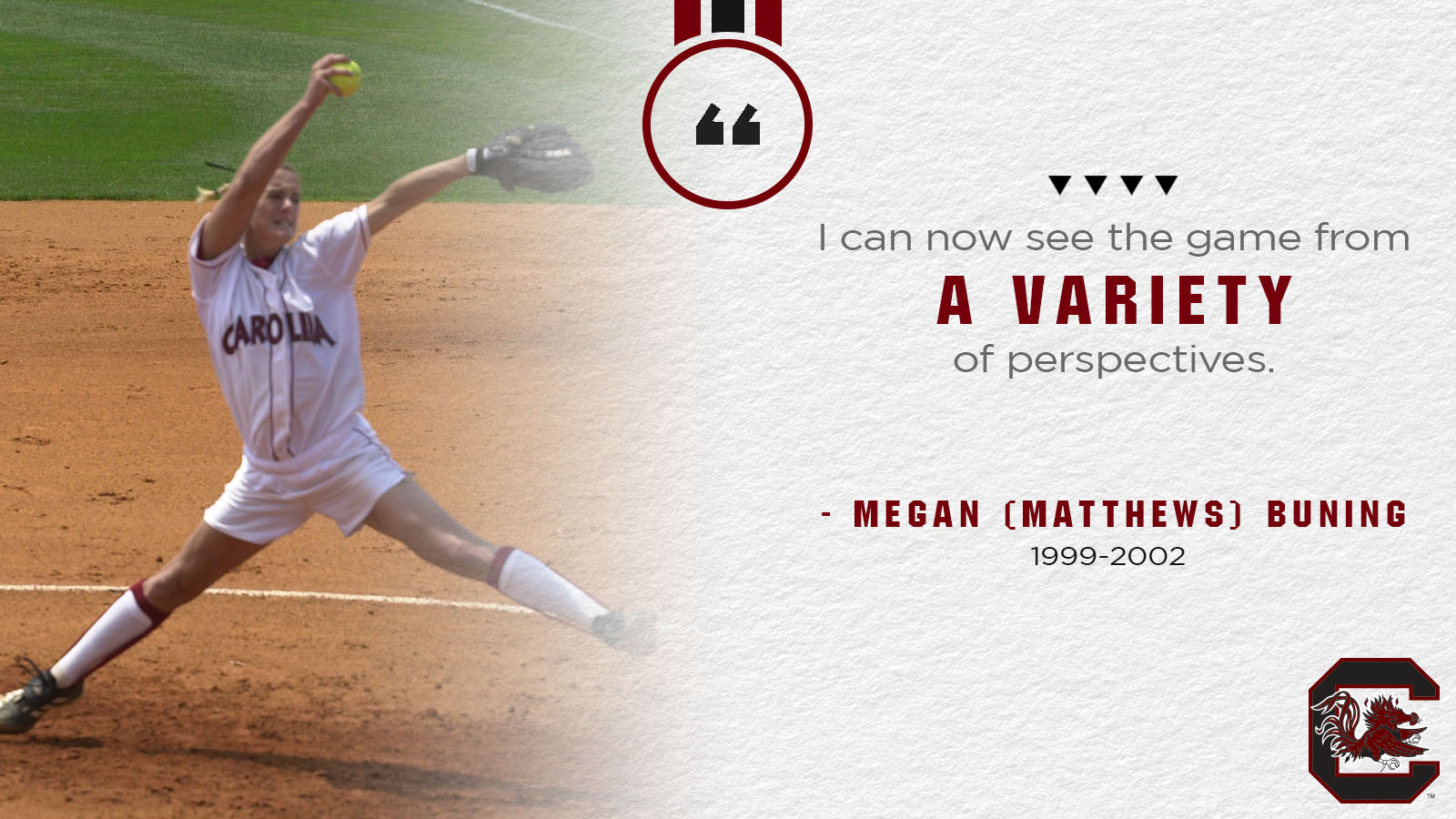
Former All-American is locked-in on mental performance
As an All-American softball pitcher with more than 1,000 strikeouts, former South Carolina standout Dr. Megan (Matthews) Buning didn’t have a problem finding the zone. As a professional, Buning has found her zone by using her experiences to shape her career and impact others. Now a teaching specialist at Florida State University’s Interdisciplinary Center for Athletics Coaching (FSU COACH), Dr. Buning is locked in on mental performance for coaches and athletes and was also recently approved to be listed on a national registry to provide mental performance work for Olympic and Paralympic athletes.

“I’m helping to build a brand new and exciting program,” said Buning, who pitched for the Gamecocks from 1999-2002 and later went into coaching. “I’m looking forward to all that work coming to fruition. I always thought that I would be building a program in softball, and it’s kind of weird that I’m helping build an academic program that applies to coaches. It’s really cool.”
FSU COACH is a coaching education degree, which also recently had a master’s degree program approved.
“Our FSU COACH students take courses in areas such as theory and practice of coaching, coaching for human performance, research for coaches, advanced topics, which is usually a recruiting type of course, finance and budgeting for coaches, marketing, and any of the areas that coaches have to deal with. We’ll also do mental performance for coaches, which is right in my wheelhouse. They also have to do 100 hours of internships where they have to work with an organization or with a coach in some capacity in the athletics setting that they might want to coach in down the road.”
As for being listed on the registry to work with Olympic & Paralympic athletes, Buning said it was satisfying to have all of her research and experience recognized as being worthy of such an opportunity.
“What this means is my work and credentials have been reviewed by the top sports psychologists in the country. This just opens the door for me to work with the Olympic population. I was working for years on a certification for sports psychology. It’s a certification that is recognized nationally.
“I’m on this registry and if a coach or an athlete needs help on mental performance work, they can go into the registry and look at my profile and see that I’m vetted for it. It’s a list of folks who have been vetted in addition to their education. It is something that gives me that extra level of rigor for the field.”
Buning’s career path has demonstrated a commitment to lifelong learning. When her playing days were over, she initially got into coaching and was an assistant at Florida State (2004-07), Coastal Carolina (2008-09) and Ole Miss (2010-11). She stepped away from the diamond and completed a Ph.D. in Higher Education Administration in 2013. She became an Assistant Professor of Research in the Department of Advanced Studies and Innovation at Augusta University and achieved promotion and tenure to Associate Professor before moving to Tallahassee last summer to start work with FSU COACH. She also became a color analyst for softball broadcasts on SEC Network+ in 2015, mostly covering South Carolina home games. The latter positions exposed her to an opportunity working with umpires.
“I have seen the value in embracing the mental work and what it could do if you are open to it.”
“I noticed how a lot of on-air dialogue on TV was coming down hard on the calls made by umpires,” Buning said. “So, I wanted to research it. Because of broadcasting, I was connected to the SEC coordinator of umpires, Christie Cornwell. We had a talk about the mental game, and at first, I wanted to get it from an umpire’s perspective about the rules and what they’re going through. In our conversation, she talked about how it was taking a toll on the umpires, mentally.”
Umpires at the time weren’t receiving mental performance training, and that opened the door for research.
“I realized there was a pocket of people involved in sports who were not receiving this sort of training,” Buning said. “At the time, I was in a tenure track position that required research. That’s where it started – the need to incorporate research into actual professional practice. During that time, I worked with more than 200 umpires and game officials. I did many workshop training sessions with the SEC and the Peach Belt Conference, and with Diamond Umpiring Academy. It was important to me because when I first started coaching, I didn’t think I was good at teaching the mental game, and I wanted to be good at it. I also saw the impact that it could have on folks who were open to it.”
As she dives into the new program aimed at educating future coaches, Buning is still learning more about the game she once dominated.
“It’s been incredible. I can now see the game from a variety of perspectives,” Buning said. “I can see it as a former elite level college athlete, as a coach, as a researcher, as a mother, and now from the perspective of what the umpires go through. Once I started working with the umpires, it made me see the game in a 3-D sense. I’m not just analyzing what pitch was called or what a coach might do, I’m also analyzing what the umpire is doing. I feel like I’ve unlocked this different view. I realize now that being a student of the game isn’t just learning your position or learning the rules of the game. It’s learning all of the moving parts. A lot of it has to do with maturation and age and letting things sink in.”
She also has a great awareness of her own educational path and can apply that in teaching as well as mental performance work.
“When I first got out of school, I was really kind of lost,” Buning said. “I got the coaching job, and it was fun, sort of, but it’s a heck of world! It’s hard. You struggle in the transition going from athlete to finding that first job. After I went from coaching to faculty and academia, it took me a while to get comfortable. It wasn’t until I realized that I had skills that I had learned as an athlete and coach that applied to teaching. I brought some of that coaching mentality into the classroom. When I had that realization, I was OK. I know a lot of athletes and coaches go through that in trying to find out what they’re supposed to do outside of their sport.”
Buning noted that early in her coaching career, she realized that not all athletes had the same strong mental mindset.
“When you’re young, you assume that you have to have a certain mindset, or else you are weak,” Buning said. “It started to fascinate me in how all the different athletes thought. As I did research, it really unlocked a part of my brain that I didn’t even know I had. I did a sort of 90-degree shift in my coaching approach. I don’t know if I was implementing what I was learning at the time, but I had a base layer of information and I knew it was important.
Fast-forward to earning her doctorate degree, where she continued her research in sports psychology and did another 90-degree shift in her approach to coaching.
“It became important to me because, as an athlete, I was very strong, mentally. I don’t know how I did that. I was frustrated because I knew it was a weakness for me as a coach in being able to help other athletes who had a strong mental game like I had. It became important to me when I started getting better at it. I was really connecting with umpires, game officials and coaches. It’s important to me because I have seen the value in embracing the mental work and what it could do if you are open to it.
“I feel like I’m in a dream position here at FSU COACH. I feel like I’ve found where I’m supposed to be.”
Buning and her husband, Shaun, have two daughters, Emory (11) and Lucy (3).



















